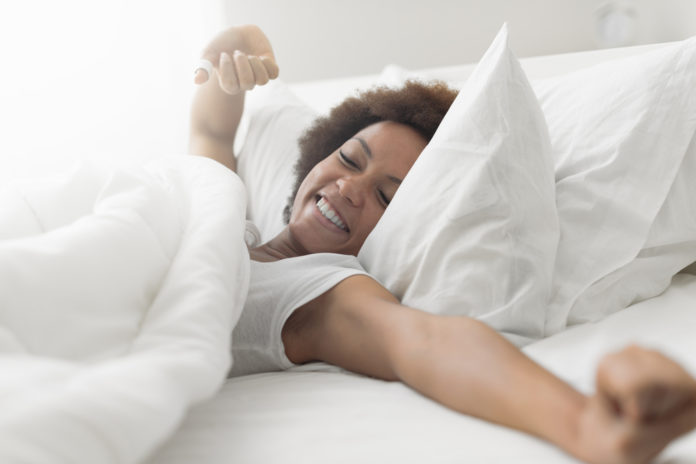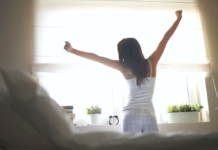While you may feel ambitious to tackle a morning workout, do a load of laundry, and prep your lunch before work, the warmth and comfort of the covers might lead to the snooze button when that early alarm suddenly goes off. But what if there was a modest tweak you can make to your nightly routine that transforms you into that notorious early bird? While it might sound too good to be true, this one simple tip will make you a morning person!
The One Simple Tip That Will Make You a Morning Person
If trying to touch the thermostat as little as possible in hopes to not break the bank, you may be breaking your slumber. Yep, the tip is simply turning the temperature down at night – between 60° to 67°F, to be exact. According to the National Sleep Foundation (NSF), anywhere between the two temperatures is optimal for the body’s natural sleep and wake cycle. But what makes these temperatures so special? The recommendations accommodate the body’s natural decrease in body temperature when trying to sleep and the proposed temps can help facilitate the process. Whether being too hot or too cold, temperatures outside of the recommended range can make it more difficult to fall asleep and negatively impact the quality of REM sleep, or the stage of sleep in which dreaming occurs. And according to WebMD, “your body tends to lose heat, which helps you fall and stay asleep,” and further mentioning, “We sleep better when we’re cooler. Your temperature starts to rise toward morning, preparing your body for wakefulness.”
Ultimately, the NSF encourages individuals to think of their bedroom as a cave: Dark, quiet, and cool. But don’t sleep too much like a caveman, as being barbaric when it comes to your mattress and sheets can cause your relationship with dreams to be rocky. Make sure your mattress is comfortable yet supportive, along with switching it out approximately every 10 years. Pillows should also be swapped about every one to two years to ensure your head and neck gets the support it needs.
Still Can’t Sleep? Try These Additional Simple Tips:
Stick to A Bedtime
Nope, growing up does not exactly dismiss the importance of a bedtime, as sticking to one can help regulate the body’s natural sleep and wake cycles. Also plan your bedtime to align with the National Sleep Foundation’s recommendation of seven to nine hours of sleep each night; if planning to to wake up at 6:00 a.m., head to bed no later than 11:00 p.m. the night prior to achieve the minimal seven hours.
Wear Socks
While wearing socks to bed is often an individual preference, the NSF suggests going without may be disrupting sleep cycles. They explain, “Heating cold feet causes vasodilation, dilation of the blood vessels, which may tell the brain that it is bedtime. After the blood vessels open in the hands and feet, heat is redistributed throughout the body to prepare for sleep.” But if not so willing to sock up, layering extra blankets at the bottom of the bed, using a warm water bottle to heat the feet, and wearing sleepers before bed are other foot-warming strategies.
Avoid Looking at the Clock
Whether trying to fall asleep or waking up in the middle of the night, looking at a clock can increase stress and anxiety and make it harder to catch those Zzz’s again. So avoid looking at a clock (and scrolling through your phone), along with engaging in a quiet, peaceful activity if you start becoming restless.
Shut Off Electronics
Televisions, phones, and tablets can be distracting for hours and inhibit the natural sleep cycle from their emitting blue light. So rather than laying in bed and scrolling the latest social media feed or catching up on the latest television series, quiet the mind by powering down all electronics.
Evaluate Other Room Factors
In addition to turning temperature down at night, consider other factors your sleeping environment. Try to be free from any light (including blue light) and disrupting sounds, using blackout blinds, ear plugs, and “white noise” machines as needed.
Try A Bedtime Snack
When those late night cravings attack, it may be hard to avoid a trip to the kitchen. These nine bedtime snacks not only help relieve hunger, but induce and improve sleep!








